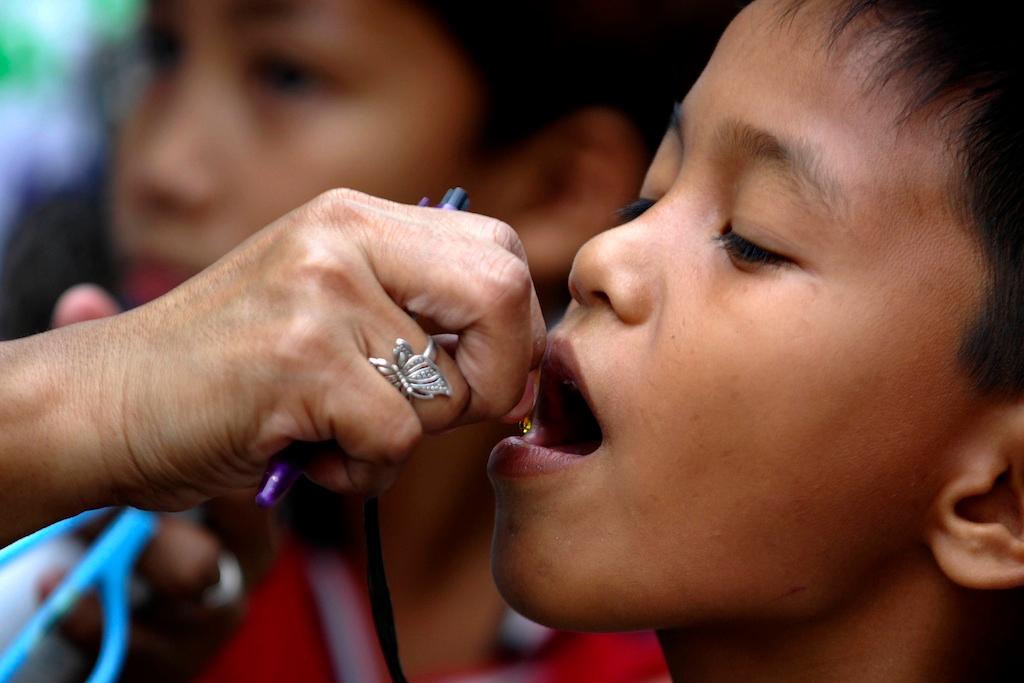Health, nutrition become priorities at Davos
A Filipino nurse gives a boy vitamins after receiving a measles vaccine injection in a slum area in Tondo, Manila, on February 23, 2010.
Dr. Klaus Kraemer is Director of Sight and Life, a not-for-profit nutrition think tank of DSM, which cares about the world’s most vulnerable populations, and exists to help improve their nutritional status. Dr. Kraemer has over 25 years of experience in research and advocacy in the field of health and safety of vitamins, minerals and carotenoids.
While the headlines out of the World Economic Forum (WEF) meetings in Davos primarily focus on getting (or keeping) the global economy on track, it’s a welcome development when nutrition and health information also rise to the top of the priorities list, reminding world leaders of the inextricable link between nutrition, health and well-being of the people on our planet and that of our global economy.
This year in Davos, several events came together in a “day of nutrition and food security,” highlighting the potential impact that improved nutrition for mothers and children could have on a family’s future, and on the future of nations. The 1,000 days from a mother’s pregnancy until her child turns two years old offer a unique window of opportunity to establish a strong foundation for a healthy and productive future. Children that are well-nourished achieve more in school and are better equipped to overcome conditions such as pneumonia or diarrheal disease, which are far too commonly fatal in developing nations. The effects of early nutrition are lasting, reaching far beyond childhood. Children who are well-nourished are able to grow to their full potential, both physically and mentally. As adults, they earn more, are healthier and for women, are more likely to have healthy pregnancies and births.
Health is inextricably linked to economic development. By improving maternal and child nutrition, we have an opportunity to create sustainable change in the lives of millions of people by bolstering efforts to advance both health and development. And, the best part is – we know how to do this.
Research, including the landmark 2008 Lancet Series on Maternal and Child Undernutrition, shows that by focusing on the 1,000 day window of opportunity and investing in three key areas of action, we can significantly improve the nutrition—and the lives—of many of the world’s most vulnerable. We can do this by promoting good feeding and caring practices, such as breastfeeding or using nutrient-dense complementary food to prevent malnutrition; increasing the intake of vitamins and minerals by pregnant women, nursing mothers and their children; and treating severe cases of acute malnutrition with ready-to-use therapeutic food. Three areas of focus; millions of lives saved.
In just the past 18 months, we have seen a global movement to catalyze support to turn these research findings into action on an unprecedented scale. Led by 26 developing countries that have committed to improving nutrition, the Scaling Up Nutrition (SUN) Movement is an effort backed by more than 100 entities, including civil society organizations, businesses, governments, UN agencies and academia dedicated to improving maternal and child nutrition. SUN is committed to aligning resources, expertise and investment to support the nutrition priorities established by the 26 lead countries.
This is a cross-sector effort built on the skills and experience of the many organizations supporting the movement. Whether it is in direct nutrition action, such as ensuring access to micronutrients, or in changing the factors that impact nutrition, such as providing training on farming practices that can increase crop yield or supporting strong nutrition policies, all stakeholders have a role to play.
Improving nutrition has been my life’s work; particularly, finding ways to alleviate micronutrient deficiencies of the world’s poor that result from a lack of the vitamins and minerals we all need.
When many of us think of micronutrients, we think of the multi-vitamin we take to supplement our diets. But in the developing world, the right micronutrients aren’t just an insurance, but mean the difference between going blind or having a clear view of the future (vitamin A); between brittle bones or having a solid foundation (vitamin D), between a lack of energy or strong mental and physical performance (iron).
The word ‘vitamin’ stems from the Latin word ‘vita,’ meaning ‘life’. Whether we get them from the foods we eat, from a fortified product, or from a tablet, these tiny building blocks are what healthy lives are made of. At Sight and Life, we are working with the SUN movement and many global partners to ensure that all mothers and children have the vitamins needed to nourish healthy, productive futures. During the WEF I had the pleasure and honor to present the inaugural Sight and Life Nutrition Leadership Award to Dr. David Nabarro, Special Representative of the UN Secretary General for Food Security and Nutrition, and the SUN movement in acknowledgement of their great leadership to catalyze a sustainable improvement in nutrition.
At Davos, we were challenged to think innovatively of how to “Shape New Models” to help strengthen the economy. We can create stable, productive economies—but we have to start with healthy, nourished people who can drive this progress.
The humble vitamin turns 100 years old this year, as 2012 marks the centennial of the discovery of these mighty compounds. As we celebrate the great impact vitamins and minerals have had on our lives (you don’t hear about too many scurvy cases due to vitamin C deficiency these days), we should also look ahead at new ways micronutrients can strengthen families, the developing world and our global community. I look forward to continuing to fight to reduce micronutrient deficiencies through our work with the SUN Movement, and I encourage you to join me in the fight.
